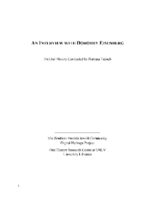Search the Special Collections and Archives Portal
Search Results

Transcript of interview with Blaine Benedict by Barbara Tabach, November 12, 2015
Date
Archival Collection
Description
Throughout this interview, Blaine shares stories of his father, Alvin Benedict. Al owned and operated Benedict and Remy Plumbing Business for a few years before entering into casino management. He is considered to be the first college educated executive and had an illustrious executive career at the MGM. He also was a co-founder with Susan and Irwin Molasky of Nathan Adelson Hospice.
Text

Transcript of an interview with Gertrude Rudiak, Richard Rudiak, and Dani Ramage by Barbara Tabach, December 30, 2015
Date
Archival Collection
Description
On December 30, 2015, a few months after her 100th birthday celebration, Gertrude Rudiak, with the help of her son Richard Rudiak and granddaughter Dani Ramage, reminisced about living in Las Vegas since 1946, nearly eighty years. They explore the ancestral roots of Gertrude (n?e Rightman) and of her deceased husband George Rudiak. Their courtship and marriage at the brink of World War II and George?s enlistment in the US Army Corps is what brought the couple to Las Vegas and the gunnery school which is now Nellis Air Force Base. After his tour of duty, George settled into a law practice where he specialized in quickie-divorces, but also carved out a reputation supporting civil rights and working for legislation to eliminate working and living discrimination of blacks in Nevada. Gertrude was an active member of Las Vegas. She played the pipe organ, hosted large Seders at Passover and managed the Rudiak household that grew to include five children. Over her long life, Gertrude embraced many positions on community boards, including being Temple Beth Sholom?s first female board member. She was also a teacher in both secular and Jewish education. Her efforts have been recognized by the Jewish National Fund, the United Jewish Appeal, and the Anti-Defamation League. Additionally, Mayor Carolyn Goodman presented Gertrude with the distinguished honor of a key to the city of Las Vegas in 2014. The city declared August 2, Gertrude's birthday, Gertrude Rudiak Day in recognition of her long-standing commitment to Las Vegas.
Text

Transcript from interview with Mike Unger by Barbara Tabach, January 21, 2016
Date
Archival Collection
Description
In this interview, Unger reflects upon his long and successful career in hotel management in Las Vegas and also in Arizona and Pennsylvania. He shares stories as a local celebrity, particularly in the 1970s and 1980s when he worked at Caesars Palace, as well as the big projects he oversaw, including organizing the first big fight nights, World Series of Tavern Poker and Grand Prix race. He talks about working with Morris Shenker, Moe Dalitz, Cliff Perlman and Billy Weinberger, and the role of the Jewish community in the city, and specifically in the gaming industry. Unger also discusses his non-gaming industry ventures which have included a satellite communications business and a bagel business.
Mike Unger was born in Queens, New York in 1947, and spent most of his childhood in Long Island, growing up in a predominantly Jewish and Italian community. As a young adult, Unger was already working hard, running one of his family?s restaurant after school. When he was in high school, his family moved to Los Angeles to accommodate his father?s health needs, and eventually end up in Las Vegas by 1967. Over the next two decades, Unger would work at nine properties in the city. Unger is one of the University of Nevada, Las Vegas? first hotel management graduates, and started his career with Summa Corporation in its management training program at the Frontier Hotel and Casino. After a brief stint at the Airport Marina Hotel in Los Angeles in 1972, Unger returned to Las Vegas, serving in management capacities at the Aladdin Hotel and Casino, Summa Corporation headquarters and Landmark Hotel and Casino. In 1978, he joined Caesars Palace Hotel and Casino management team, and was integral in creating the city?s first large boxing events, the World Series of Tavern Pool, and the Grand Prix race. Unger also ran properties for the White Mountain Apache and Colorado River Indian Tribes in Arizona, as well as the Showboat Hotel and Casino. In this interview, Unger reflects upon his long and successful career in hotel management in Las Vegas and also in Arizona and Pennsylvania. He shares stories as a local celebrity, particularly in the 1970s and 1980s when he worked at Caesars Palace, as well as the big projects he oversaw, including organizing the first big fight nights, World Series of Tavern Poker and Grand Prix race. He talks about working with Morris Shenker, Moe Dalitz, Cliff Perlman and Billy Weinberger, and the role of the Jewish community in the city, and specifically in the gaming industry. Unger also discusses his non-gaming industry ventures which have included a satellite communications business and a bagel business.
Text

Transcript of interview with Rabbi Mel Hecht by Barbara Tabach, March 17, 2016
Date
Archival Collection
Description
In this interview, Hecht talks his life experiences leading him to becoming a rabbi, eventually being a spiritual leader in Las Vegas. He discusses his experiences at Ner Tamid as well as the joy of starting Temple Beth Am, with the support of Morris and Lillian Shenker. Hecht shares stories about working with unions and Ralph Engelstad.
In 1939, Rabbi Mel Hecht was born in Detroit, Michigan. At the age of five, his family moved to Miami, Florida where they had a large, extended Jewish family, complete with relatives who were hazzans and mohels. Soon after moving to Florida, his parents bought a hotel in Hialeah, about 10 miles outside of the city, where Hecht spent the remainder of his childhood. Hecht attended the University of Miami where he earned a Ph.D. in Divinity, and subsequently attended the Hebrew University of Jerusalem. In 1971, he became a rabbi upon graduating from seminary in Cincinnati, Ohio. Three years later, Hecht joined the U.S. Army and served as a race relations officer in Germany. After his service, Hecht returned to Florida (Fort Pierce) to lead his own congregation, and in 1980, he moved to Las Vegas and became the congregational rabbi for Congregation Ner Tamid. Two years later, he left Ner Tamid to start a new congregation?Temple Beth Am?which grew swiftly. In 1982, Hecht also married Michelle (?Micki?). The couple have three children: Melissa Hecht, Karin Toti, and Adam Hecht.
Text

Transcript of interview with Priscilla Schwartz by Barbara Tabach, June 16, 2016
Date
Archival Collection
Description
In this interview, Schwartz talks at length about her passion for compassionate hospice care, and her broad involvement with the Nathan Adelson Hospice, from volunteering to serving on the board to philanthropy, which included opening the Walter Schwartz Center for Compassionate Care. Schwartz also talks about other philanthropic giving which includes establishing scholarships at George Washington University and University of Michigan as well as support to Temple Beth Sholom gift shop.
Text

Transcript of interview with Charlene Herst by Barbara Tabach, September 09, 2016
Date
Archival Collection
Description
In 2014, Charlene, n?e Friedkin, Herst retired from her state government career, settled into volunteer work, being a mother and grandmother, and being a grant writer for others. After thirteen years in Carson City, she came back home to Las Vegas. Charlene was eight years old when her parents, Patricia and Richard Friedkin, moved their family to Las Vegas from northern California. She remembers vividly the hot day that they arrived and moved into a rental house in the desert across from Woodlawn Cemetery. Her father, formerly in the grocery business, found work at Vegas Village. Two years later they moved ?into Las Vegas at the very edge?which was Oakey.? She recalls people she has known since those first years who have been instrumental in the growth of Las Vegas; the challenges of being a divorced single mother of four; and the career path that began with an invitation from Gene Greenberg to apply for a part time position at Channel 3, where he was sales manager. At Channel 3 she quickly went from part time to full-time. She started the Community Projects Board, which brought together nonprofit organizations together at the studio in the 1980s to identify and develop marketing campaigns that addressed social issues in the community. Initiatives included Baby Your Baby and Smoking Stinks. While working for Channel 3, she also attended UNLV and received a communications degree in 1995. In 1997 she worked at Sierra Health Services in public relations. Then in October 2001, Charlene started her career in state government as the Nevada State Health Division?s Manager of the Tobacco Program. Over the course of her thirteen year career with the state, she was promoted to positions that continued her dedication to improving the quality of life of all Nevadans. She was instrumental in the implementation of the Nevada Clean Indoor Air Act (2006); improving prevention services to women; reducing the rate of substance use and abuse in the state. The date of her retirement, October 10, 2014, was officially proclaimed in honor of Charlene Herst by Governor Brian Sandoval.
Text

Transcript of interview with Doug Unger by Barbara Tabach, August 26, 2014
Date
Archival Collection
Description
Interview with Doug Unger by Barbara Tabach on August 26, 2014. In the interview, Unger discusses his schooling, his family's mattress business, and his endeavors in the company and the mattress industry in Las Vegas. Unger becomes involved in Holocaust education and the Sperling Kronberg Mack Holocaust Resource Center.
Doug Unger was born in Cleveland, Ohio, and grew up working summers in a mattress factory, a family business started by his maternal grandfather. After graduating from high school in Cleveland, Doug attended the University of Cincinnati until moving to Steamboat Springs, and enrolled in Denver University, though ended his college career one class away from graduation. Eventually, Unger moved back to Cleveland, then to Las Vegas. In 1976, Dough bought Supreme Mattress and moved to Las Vegas to build his new business. Outside his successful career, Doug was always an active member in the city's Jewish community. He joined Congregation Ner Tamid, where he was a trustee. He became involved with the Jewish Federation, serving as treasurer and later as president. When he moved to Reno, Doug joined Temples Sinai and Emanu-el, and also became heavily involved with Guide Dogs for the Blind Friends Committee, serving as its director for a period of time. He was also the co-chair of the Governor's Advisory Council on Education Related to the Holocaust (GAC). Doug was instrumental in establishing the Library for Holocaust Studies as a successful organization, independent of the Jewish Federation. The Library is now located in its own, donated space, run by trained staff, and receives $200,000 from the state biennially.
Text

Transcript of interview with Myra Berkovits by Barbara Tabach, August 21, 2014
Date
Archival Collection
Description
Interview with Myra Berkovits by Barbara Tabach on August 21, 2014. In this interview, Berkovits talks about growing up and starting her teaching career in Chicago. When she moves to Las Vegas, Berkovits eventually purchases a dining concierge business, but returned to teaching, and is now involved with the Sperling Kronberg Mack Holocaust Resource Center.
Myra Berkovits was born Myra Mosse in 1944 in Chicago, Illinois. She became an elementary school teacher in Chicago before moving to Las Vegas in 1980. Myra has made contributions to Las Vegas in the public and private sectors. She owned several businesses then returned to teaching, heading to the University of Nevada, Las Vegas (UNLV) to renew her teaching license and later received her master's degree. After a year of teaching in multicultural education, Myra was then in charge of the school district's homeless program, seeing its growth from serving 1,200 to 6,000 students. Myra's other passion was for Holocaust education and she became one of six interviewers in the city for the Shoah Foundation, documenting survivors' stories. One interviewee, David Berkovits, would later become her husband of fifteen years. Myra's own Holocaust education was aided by powerful trips to Israel and Poland. She used these experiences to develop and lead student-teacher conferences and classroom curriculum for the whole state. Myra still serves at the Education Specialist at the Holocaust Resource Center.
Text

Transcript of interview with Dorothy Eisenberg by Barbara Tabach, October 23, 2014
Date
Archival Collection
Description
Interview with Dorothy Eisenberg by Barbara Tabach on October 23, 2014. In this interview, Eisenberg discusses her upbringing on the east coast and becoming a widow with four children. She met her second husband at a synagogue, and they moved to Las Vegas for a fresh start. Eisenberg became involved with Temple Beth Sholom, and the Las Vegas League of Women Voters. She has a school named after her in the Clark County School District.
Dorothy Eisenberg is a first generation American, with roots in Ukraine and Central Europe, and grew up in Philadelphia. Judaism was a significant part of Dorothy's life from the beginning, and both her and her brother spent many of their afternoons at Hebrew school and most weekends at Shabbat services as adolescents. Eisenberg moved to Las Vegas with her children and second husband in 1964. She became an influential member of the community and served as the Jewish Federation of Las Vegas's first female president. She was also actively involved in the League of Women Voters of Las Vegas Valley, including leading the organization's advocacy for school desegregation and serving as its president for two years.
Text

Transcript of interview with Adele Baratz by Steve McClenachan, March 3-4, 1979
Date
Archival Collection
Description
Interview with Adele Baratz by Steve McClenachan on March 3 and 4, 1979. In this interview, Baratz talks about growing up in Las Vegas and her her schooling. She graduated from Las Vegas High School in 1944, and discusses the rationing that took place during World War II. She went to Maryland for nursing school and returned to Las Vegas in 1947. She describes some of the hotels and casinos, and tells the story of her father trading property for an automobile in 1935. She also recalls the building of Hoover Dam, swimming in local pools, and going to Mount Charleston in the winter. The interviewer asks her about travel between Las Vegas and California and the impact of Atlantic City on Las Vegas tourism. Baratz then talks about her nursing career and starting a re-certification program in 1974 and the different hospitals in the area.
Text
